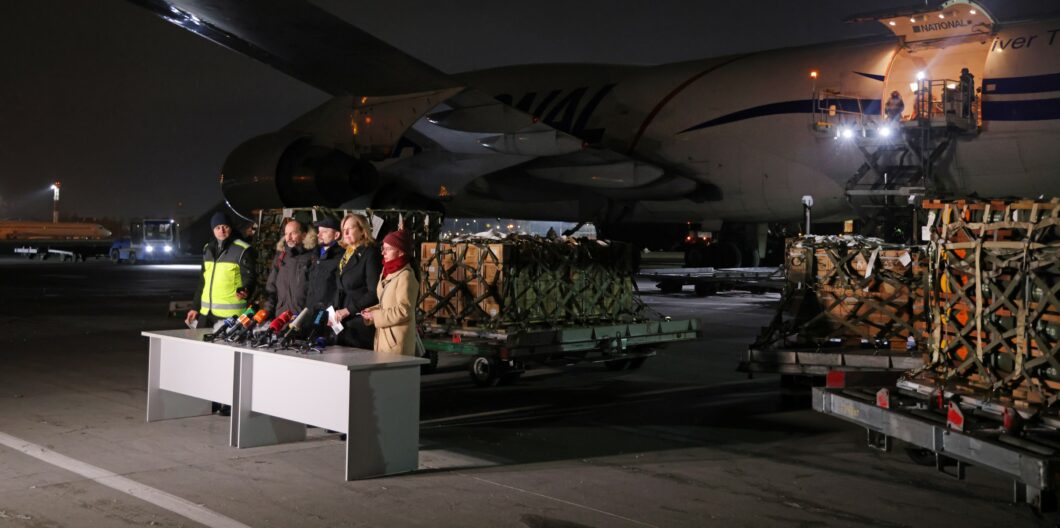Vladimir Putin is playing for the highest geopolitical stakes. Can the U.S. government afford to do less?
Sleepwalking in Ukraine
If Thucydides makes an appearance in popular discourse today, it’s usually because of his thesis on the inevitability of conflict between an established and a rising power, something that might help understand relations between the United States and China. But his account of another momentous episode may be more pressing.
Athens was engaged in a protracted war with Sparta for years, living for six years uneasily under the Peace of Nicias, when news arrived that Leontini one of their allies in the distant island of Sicily was being threatened by a Spartan ally. Seeing an opportunity to prevent the Spartan alliance from getting stronger, and to acquire riches in the process, the Athenian assembly foolishly chose to send an expedition to Sicily.
The consequences of the Sicilian Expedition were tragic. The fleet was defeated with a great loss of men. Athens was so weakened by that defeat that it eventually lost the war and its democratic form of government in the process.
The Athenians were fooled by an ally who lied to them by saying they could pay for the expedition. They also fooled themselves into believing that by conquering those distant territories they would not only weaken their adversary but strengthen their own position. Finally, they assessed wrongly the limits of their military power and competence, escalating what was already a serious war into a conflict of even bigger proportions.
Tens of thousands of Athenian citizens died (at the time, the city had barely more than a hundred thousand), their fleet was destroyed, their treasury was depleted, their allies abandoned them, and after losing the war, in its aftermath, Sparta installed an authoritarian regime to replace their democracy.
All of that because of hubris, compounded by greed, volubility, and a range of other human weaknesses.
Is the cavalier attitude of the Athenian assembly in deciding to expand a military conflict that was already too taxing on Athenian society very different from the one animating the American response to the war in Ukraine?
The immediate causes of the current war in Ukraine, and whatever responsibility the West has in it have recently been discussed in these pages against the backdrop of mediate causes such as the end of the Russian Empire and the creation of the Soviet Union at the end of the Great War, the Holodomor, and the horrors of WWII.
We do not need to go that far back to see the dangerous situation the United States is in. We just need, first, to remind ourselves that like the United States, Russia has thousands of nuclear weapons and secondly, that it is in the interest of humankind to avoid nuclear Armageddon.
Like the people of Leontini, Ukraine is not a pawn in some geopolitical chess game. It has its own mind and aspirations. Ukranians decided that their future was more aligned with the West than with Russia. However, whatever aspirations they may have, none of them justify risking human civilization in a nuclear Armageddon, and that is something we should not lose sight of.
We’ll never know if Russia would have grudgingly accepted a westernized Ukraine if the West had kept their side of the bargain, that is, a Ukraine militarily weak and most important of all, not directly aligned with the West, either through NATO or the EU.
At some point around 2007, all of that was forgotten. In 2008, the United States offered to Ukraine a path to NATO membership and at the Bucharest Summit, the allies obliged.
Tensions remained high, but the status quo was maintained until Ukraine and the European Union (EU) came closer to signing a treaty in 2013 integrating Ukraine decisively into the Western economic and political bloc. Eventually, that step contributed to Russia’s 2014 invasion of Eastern Ukraine and Crimea.
The answer of the West, suddenly reminded of the conditions for peace in Europe? They sent blankets to help the Ukrainians confront the invasion. The Russians, however, stopped short of invading the entire country—taking only Crimea and the Donbas. That created conditions for greater Western military assistance to Ukraine, mainly in the form of training.
According to the most common understanding of the rules of NATO’s creation, a disputed border would prevent any country from even applying for membership, so the 2014 invasion of Crimea was more than just a reminder note from the Russians to the West, it was also an insurance policy, or so the Kremlin thought.
Fast forward to 2021 and the United States, again declared that in spite of everything, NATO membership for Ukraine was in Ukraine’s hands. The result? A few months after the declaration, the Russians invaded.
In contrast to the invasion of Crimea, last year’s invasion had the goal of regime change in Ukraine and possible annexation of some territories to Russia—had all gone well for Russia.
As we know, it did not. And so the West had several options.
First, Western governments could have realized that the Russians are serious about keeping the status of Ukraine as a buffer zone and refused to send Ukraine anything other than humanitarian aid. As we know, that is a path not taken.
Second, they could have declared open war with Russia. That is another path not taken, at least so far.
Instead, they decided to fight a proxy war with Russia by supporting Ukraine militarily. One justification often heard for this course of action is that if Russia is not contained in Ukraine, soon it would invade a NATO country.
I think that this risk is overstated.
The risk for NATO countries of a Russian invasion seems minimal to me. Good evidence for that is found in the urgency that Sweden and Finland have decided to apply for NATO membership. It seems reasonable to assume that NATO members are protected as much as possible from war with Russia, as long as certain conditions remain valid.
The Russians may well, eventually, leave Ukraine (except for Crimea and the Donbas one would imagine), but only after they have crippled the country for a generation.
NATO countries may face asymmetric war with Russia, but they need not worry about invasion as long as the NATO treaty and its article V clause remain in force, and the United States does not lose its military edge due to its internal problems, political divisions, cultural disorientation, fiscal indiscipline, etcetera.
Regardless of its merits, Western assistance has drastically intensified from the outset of the conflict. And that has contributed decisively to the successes, so far, of the Ukrainians in defending themselves.
In the process, the war has escalated incrementally. A NATO country fighter plane was shot down, the main economic link between Russia and Europe was the object of sabotage hundreds of miles from the conflict, and that’s just what our governments are telling us.
Now NATO countries have agreed to send tanks to Ukraine, and have seriously considered sending fighter jets.
This gradual escalation has created a situation in which it’s unclear whether Ukrainian failure or success is more dangerous for the peace of the West.
Each day this war goes on, the escalation continues and the risk of a mistake that may lead to a direct confrontation between NATO and Russia increases.
What might the Russians be willing to do in order to signal to the world that they consider, rightly or wrongly, the situation in Ukraine to be an existential threat? Might they use a nuclear weapon in Ukraine? That is the risk mentioned by Prof. John Mearsheimer.
I am not saying that the Russians have a legitimate claim to invade their neighbor. But the fact is that they did invade Ukraine, that it seems unlikely that they will risk a direct confrontation with NATO by invading a member of the alliance, and that they have thousands of nuclear weapons: that is all I am saying. And that is enough.
Before we continue, we should ask ourselves, what do the American government and its allies think will result from their current policy? At times it seems that they think that Western support will help push Russia out of Ukraine entirely, and a unified, strengthened, and pro-Western Ukraine will emerge from the wreckage. Is this at all likely?
Are they seriously thinking that Russia will give up on having a weakened Ukraine at its southern border? Out of fear of escalation, the support given to Ukraine has come so far with the strings attached that they should not attack Russian territory. Is it realistic to expect that they will win a war in which they cannot attack the bases from which Russia projects its power?
The Russians may well, eventually, leave Ukraine (except for Crimea and the Donbas one would imagine), but only after they have crippled the country for a generation, destroying its infrastructure, its economic base, and possibly forcing it to adopt the authoritarian ways in which human societies tend to deal with such existential emergencies.
Is this Pyrrhic “victory” what the Western governments want to obtain? The key considerations here are the depth of Russia’s commitment to keep Ukraine as a buffer zone between it and NATO and the strength of the Russian military. If the Russians cannot win the war by taking the regions they want and forcing regime change in Ukraine, would they be content with anything less than destroying Ukraine’s state capacity for the foreseeable future?
It may not be pleasant to realize that, but that is a different way to say that the Western governments are prepared to fight until the last Ukrainian.
Can our governments be sure that even that is achievable without leading to a direct confrontation between NATO and Russia? I doubt it.
My understanding until a few years ago is that the United States had learned the lesson of the Vietnam War labeled by the press as the “Powell doctrine,” after former Secretary of State Colin Powell. That is, that the US should only use military force to achieve a clear and well-defined political objective that is achievable by the use of its military capabilities.
As we know, with the second Iraq war and the Afghanistan war, that doctrine was thrown out of the window, once the political goals the US had in mind at the beginning of those conflicts proved to be unrealistic. That wars tend to be costlier than originally imagined and their results uncertain are exactly the reasons to adhere to the doctrine instead of simply abandoning it.
If the Athenian assembly had listened to Nicias and instead of appointing him to command the Sicilian expedition; had they kept the peace with the Spartans and resisted the temptation to intervene in that distant island, much blood and treasure, and even the Athenian form of government could have been saved from the destruction that came with their defeat.
When it comes to war—including proxy war—governments must always have their endgame in mind. What national interest do they want to achieve by following the current path of action? If that is not realistic, what then is the second best, and the third best, and so on? But they cannot sleepwalk, especially in the direction of conflict with a regime that has thousands of nuclear weapons and is feeling more and more trapped in a corner.



